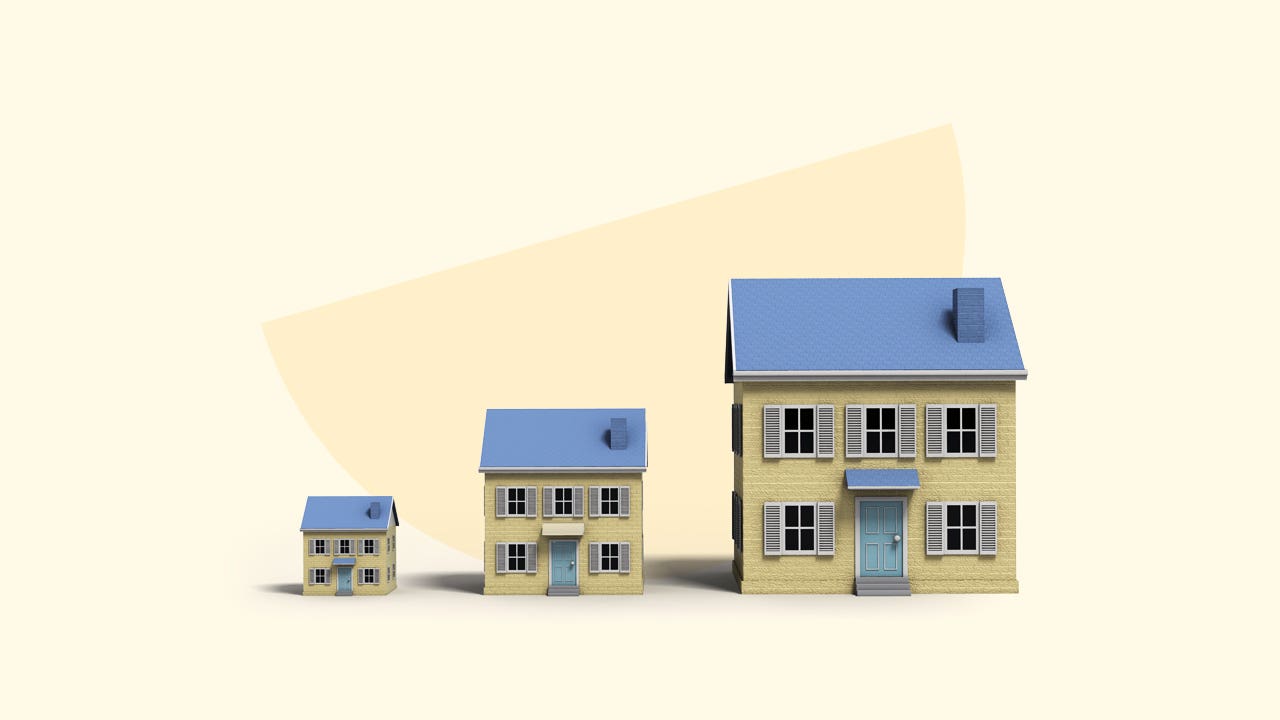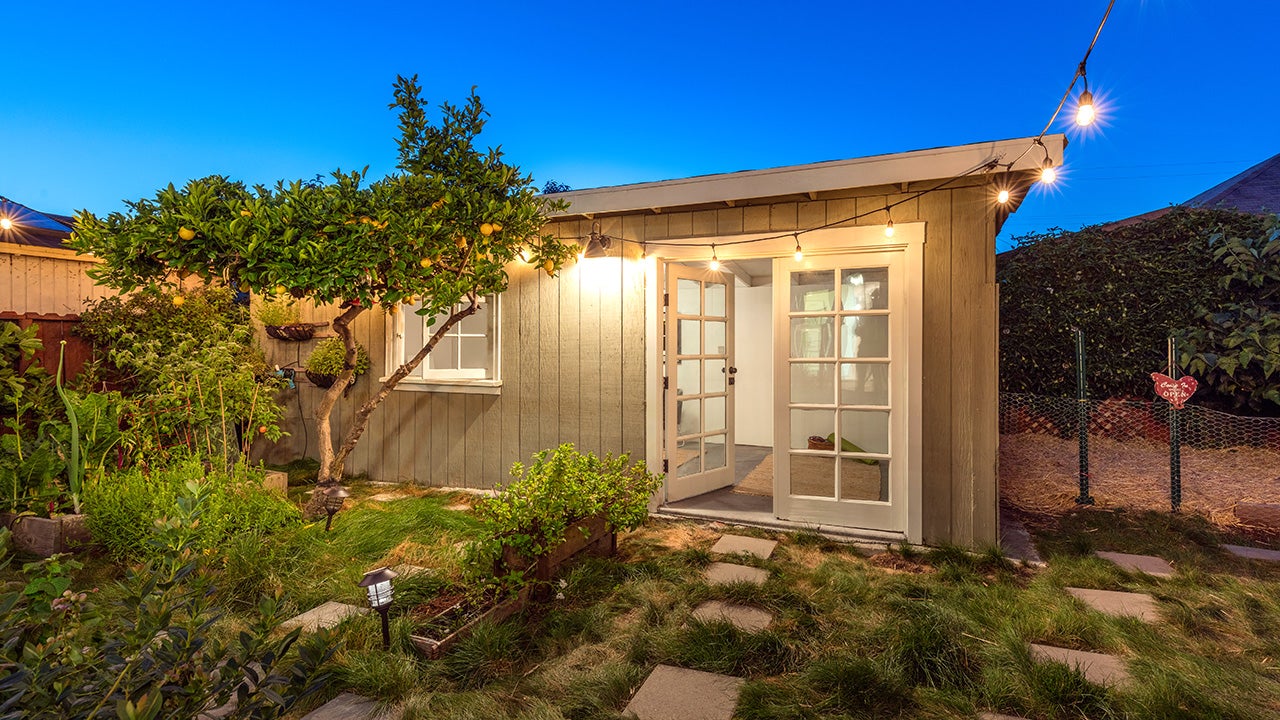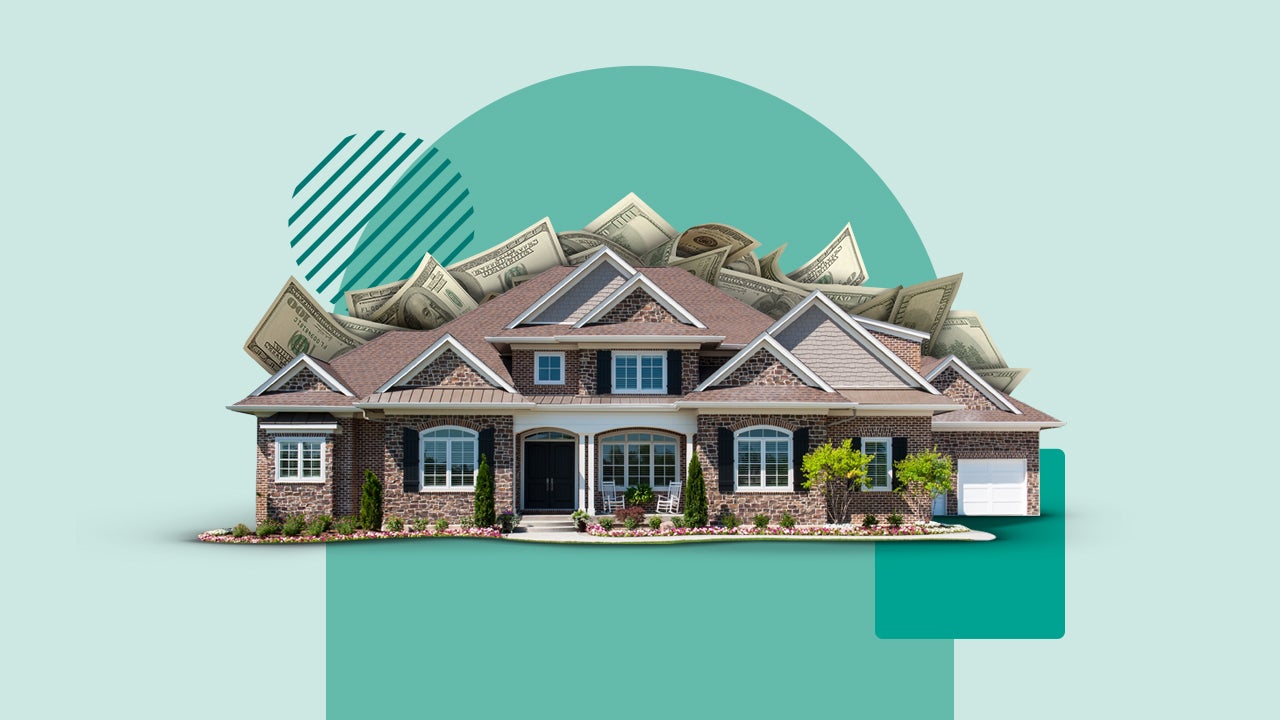How big of a house do you really need? How home sizes have evolved over time

Key Takeaways
- Many current homeowners regret buying a house that turned out to be too small, or too big, for their needs.
- New single-family homes have been shrinking, with the median square footage decreasing in each of the past several years.
- A big home offers more space, but it also comes with higher maintenance and utility costs and the potential for a higher property-tax bill.
If you could step back in time, you would find some fairly small places to call home. According to data from the U.S. Census Bureau, the median size of a single-family home in the 1960s was 1,500 square feet. For baby boomers and Gen-Xers, though, the adage of “bigger is better” certainly rings true: By the early 2000s, the median home size had climbed to 2,200 square feet, and beyond.
The law of gravity, however, seems to apply to the homebuilding industry: Home sizes are now shrinking, even as prices keep rising. Are homebuyers simply getting less for their money these days, or are there more complex factors at play? Read on to learn how home sizes are changing, why they keep getting more expensive and what the average home size in the U.S. is today.
How big of a house do Americans really want?
Data shows that homebuyers might want to spend more time thinking about how much space they really need. In Bankrate’s 2025 Homeowner Regrets Survey, many homeowners expressed some form of regret about the purchase of their home. Among those who expressed regrets, 21 percent said they felt the home they bought was too small, while 11 percent felt they bought a house that was too big.
Notes: Respondents could select more than one response; Percentages are among those who have a regret about purchasing their current home.
Source: Bankrate survey, April 2-4, 2025
If so many homebuyers have regrets about the size of their home, what size do they really want? Here’s a breakdown, according to a 2024 study by the National Association of Home Builders:
- smaller than 1,200 square feet: 8%
- 1,200 – 1,599 square feet: 18%
- 1,600 – 1,999 square feet: 21%
- 2,000 – 2,999 square feet: 38%
- 3,000 – 3,999 square feet: 8%
- larger than 4,000 square feet: 6%
New homes have been getting smaller
While the median home size has jumped significantly since the 1960s, it has begun trending downward in recent years. Census data shows that, in 2015, the typical new-construction home hit a peak of 2,467 square feet. By 2024, that number had shrunk to 2,146 square feet.
Should buyers looking for new construction today be prepared to have less storage space, then? Or less living space? Not necessarily, says Jeff Ostrowski, principal writer at Bankrate. Modern homes have different layouts than older ones, he says — they have largely abandoned formal dining rooms and living rooms, for example.
“Builders say that they’ve gotten a lot more efficient at maximizing space over the decades,” Ostrowski says. “Just because a new house is smaller by 100 or 200 square feet than an older house doesn’t necessarily mean it’s not as functional.”
If homes are shrinking, why are prices rising?
Unfortunately, a smaller space might not come with a smaller price tag. Instead, a surprising reality has emerged: Even as homes are getting smaller, the amount of cash you need to buy one is getting larger. In June 2024, the median sale price for an existing home in the U.S. hit a record high of $426,900 — the highest price ever recorded by the National Association of Realtors. And today’s median price, $414,000 as of April 2025, is not far off that record.
“It’s sort of like the ‘shrinkflation’ that consumers are seeing at the grocery store,” Ostrowski says. “That smaller container of ice cream or cereal costs more than it used to.”
One big piece of the puzzle is one of the basic laws of economics: supply and demand. More people want to buy homes than there are homes available to purchase, says Ostrowski. While that imbalance fuels a run-up in prices, there’s also another key factor at play: geography.
“The [home] that you live in is really just a fraction of the overall property price,” Ostrowski says. “Land prices are what’s really been going up in places like California, Seattle and Boston. It’s not that a 2,000-square-foot house costs 10 times as much money to build in Silicon Valley as it does in the Chicago suburbs. It’s really the underlying dirt. That’s the big distinction between prices in St. Louis and San Jose.”
Pros and cons of a big house

Pros
- Ability to spread out: The biggest upside of a big house is pretty simple: It’s big. Instead of feeling cramped in an insufficient living space, you’ll be able to designate certain rooms for certain activities: a home office for working, a playroom for children, a guest room for visiting family, etc.
- Room to grow: If you buy a bigger home today, you’ll be able to accommodate the demand for more space down the road. If you choose to expand your family or need to care for an aging relative, for example, you’ll be prepared instead of facing a need to sell and buy a bigger place.
- Potential for rental income: Depending on the layout of your home, you may even be able to earn some additional cash as a landlord. For instance, if you buy a bigger property with an ADU, you can find a long-term tenant to subsidize your living expenses.

Cons
- Higher utility costs: A bigger space often means bigger bills. For example, if you need to air-condition a 3,000-square-foot home in Phoenix, you might wind up wishing you chose a smaller space — and the same goes for heating a big space during a Minneapolis winter.
- More maintenance and upkeep: More room also creates more work. Before you buy a huge home, consider whether you’re willing to deal with keeping all that space clean, not to mention landscaping and yardwork. In the Homeowner Regrets Survey, among homeowners with regrets about purchasing their current home, 42 percent felt that maintenance and other hidden costs were more expensive than they anticipated.
- Steeper property taxes: Keep property taxes in mind, too. A larger home often means a higher assessed value, and depending on the rates in your area, you can be on the hook for some hefty costs.
Affordability tips if you want more space
For many homebuyers, there’s a discrepancy between how big of a house you want and how big of a house you can actually afford. If you’ve weighed the pros and cons and you’re convinced that you need as much room as possible, here are some money-saving tips:
- Be open to relocation: Are you tied to one specific area, or can you cast a wide net? “One possibility is moving away from the pricey coastal real estate markets,” Ostrowski says. “There are a lot of places in the Midwest and the Rust Belt that are very affordable. You can get a 3,000-square-foot home for less than the national median sale price.”
- Consider a fixer-upper: If you can’t relocate to a place with a lower cost of living, are you comfortable buying a home that won’t immediately feel like home? “Fixer-uppers are a possibility,” Ostrowski says. “If you’re willing to do some of that work and endure some of those headaches, you might be able to get more space at a more affordable price.”
- Build up your credit score: The higher your credit score, the lower your mortgage rate is likely to be. The most credit-worthy buyers will qualify for the very best rates from lenders, so if yours is less-than-stellar, consider holding off on your home search and taking some time to raise your score. A lower rate will save you plenty of money over the life of the loan, regardless of the home’s size — or sale price.
Why we ask for feedback Your feedback helps us improve our content and services. It takes less than a minute to complete.
Your responses are anonymous and will only be used for improving our website.
You may also like


Tiny homes: Are they worth it?




